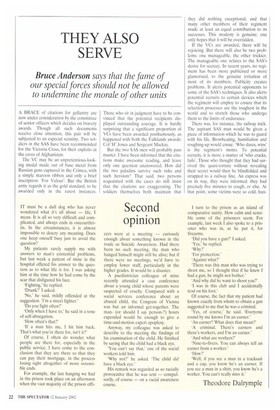Second opinion
IT must be a dull dog who has never wondered what it's all about — life. I mean. It is all so very difficult and complicated, and always ends in osteoarthritis. In the circumstances, it is almost impossible to descry any meaning. Does one keep oneself busy just to avoid the question?
My patients rarely supply me with answers to man's existential problems, but last week a patient of mine in the hospital offered his answer to the question as to what life is for. I was asking him at the time how he had come by the scar that disfigured his face.
'Fighting,' he replied.
'Drunk?' I asked.
'No,' he said, mildly offended at the suggestion. 'I'm a street fighter.'
'Do you fight often?'
'Only when I have to,' he said in a tone of self-abnegation.
'How often's that?'
'If a man hits me, I hit him hack. That's what you're there for, isn't it?'
Of course, I often do wonder what people are there for, especially in the public service. I have come to the conclusion that they are there so that they can pay their mortgage, in the process losing sight altogether of more ostensible ends.
For example, the last hanging we had in the prison took place on an afternoon when the vast majority of the prison offi cers were at a meeting — curiously enough about something known in the trade as Suicide Awareness. Had there been no such meeting, the man who hanged himself might still be alive; but if there were no meetings, we'd have to employ fewer staff, particularly in the higher grades. It would be a disaster.
A paediatrician colleague of mine recently attended a case conference about a young child whose parents were suspected of cruelty. Compared with a social services conference about an abused child, the Congress of Vienna was but an informal get-together. The man(or should I say person-?) hours expended would be enough to give a time-and-motion expert apoplexy.
Anyway, my colleague was asked to describe to the meeting the findings of his examination of the child. He finished by saying that the child had a black eye.
'You can't say that,' one of the social workers told him.
'Why not?' he asked. 'The child did have a black eye.'
His remark was regarded as so racially provocative that he was sent — compulsorily, of course — on a racial awareness course. I turn to the prison as an island of comparative sanity. How calm and sensible some of the prisoners seem. For example, last week I also spoke to a prisoner who was in, as he put it, for firearms.
'Did you have a gun?' I asked.
'Yes,' he replied.
'Why?'
'For protection.'
'Against what?'
'There was this man who was trying to shoot me, so I thought that if he knew I had a gun, he might not bother.'
'And why did he want to shoot you?'
'I was in this club and I accidentally trod on his foot.'
Of course, the fact that my patient had known exactly from whom to obtain a gun suggested to me that he was a criminal. 'Yes, of course,' he said. 'Everyone round by me knows I'm an earner.' 'An earner? What does that mean?'
'A criminal. There's earners and there's workers, and I'm an earner.' 'And what are workers?'
'Nine-to-fivers. You can always tell an earner from a worker.'
'How?'
'Well, if you see a man in a tracksuit and a cap, you know he's an earner. If you see a man in a shirt, you know he's a worker. You can't really miss it.'
Theodore Dalrymple


























































 Previous page
Previous page